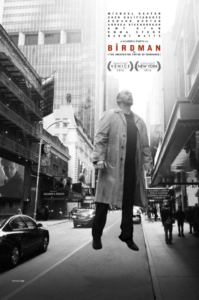EDITOR’S NOTE: This review first appeared in print and online at http://www.times-herald.com/

 “I’m broke. I’m not sleeping like at all. And, ah, this play is kinda starting to feel like a miniature, deformed version of myself that keeps following me around…” Riggan Thompson whines to his daughter after a failed preview performance in “Birdman.” The film takes place backstage on Broadway.
“I’m broke. I’m not sleeping like at all. And, ah, this play is kinda starting to feel like a miniature, deformed version of myself that keeps following me around…” Riggan Thompson whines to his daughter after a failed preview performance in “Birdman.” The film takes place backstage on Broadway.
Michael Keaton plays Thompson, an egotistical, narcissistic, aging movie star. Thompson’s defining role was twenty years ago when he wore a ridiculous bird costume and played a superhero named, you guessed it, Birdman. Not a “bat,” mind you, but a “bird” costume. Sure, viewers will immediately think of Keaton’s famous turn as Batman in the Tim Burton series, but trust me, after a few minutes watching Keaton as Thompson in “Birdman,” you might forget that he ever once donned the cowl of the Dark Knight. At least, Keaton sure hopes Oscar voters will forget.
The magic of “Birdman” is that it is utterly unique while never becoming completely alien. As Thompson attempts to redefine himself far from Hollywood by writing, directing and starring in an adaptation of a Raymond Carver story, it is impossible not to be drawn in and enveloped by the struggle of everyone involved. Part of the film’s success is the remarkable casting, but a great deal of the credit belongs to director Alejandro González Iñárritu (“Babel,” “Amores Perros”) and his gifted cinematographer Emmanuel Lubezki (“Gravity”). Their efforts create a seamless integration of sequences one continuously leading to another without visible cuts. Transitions are cleverly used so that the narrative flows almost in real time with hand-offs between sequences fantastically unfolding. This dizzying technique keeps everything constantly in motion and will unnerve but keep transfixed even the most cynical of viewer.
The camera follows Thompson from the confines of his dirty dressing room in a famous Broadway theater, down narrow hallways, along the skeleton that makes up the backstage, passed odd stage hands and personnel and ultimately onto the stage itself. The camera is so smooth and the point of view so tight that it makes the viewer feel less like a fly on the wall and more like a member of the acting troupe. Anyone who has ever participated in theater on any level will immediately identify with the scene that is set. And by the end of the film, viewers will have a working knowledge of the backstage as though they have been there. The repetition that is employed as Thompson mills around and paces and takes his place is like a series of rehearsals leading up to opening night. And this is literally what Director González Iñárritu is trying to achieve both visually and narratively. The success of this combination of sight and sound and story is nothing short of stunning. It is clear that González Iñárritu and his team of writers studied closely the films of Robert Altman, “The Player” being a touchstone, and “Short Cuts,” also, based on Carver’s writings. González Iñárritu saw in those films what few of us could ever articulate and, I will try to posit my take: it is capturing the illusive quality that makes film the most immersive of story-telling mediums.
But aside from my fanboy gush as to the marvelous melding of camera and story, the performances in “Birdman” could not have been better. Much of the attention will center on Keaton in his career redefining performance as Thompson. In a scene, he candidly tells his ex-wife (played by Amy Ryan) that one time on a rocky plane ride with George Clooney he imagined how awful it would be if Clooney’s face, instead of his own, graced the front page of the papers should the plane crash. Thompson is so self-obsessed that the rest of his life has fallen apart. His daughter Sam (Emma Stone) has just left a rehab and now serves up defensive sarcasm in buckets as his flighty assistant. Thompson’s best friend and attorney played by Zach Galifianakis (in straight man form) is a rock, but, also, appears to have no life. And Thompson doesn’t help things by conducting an affair with a co-star (Andrea Riseborough).
But when a key cast member is replaced by an equally self-obsessed theater star played by Edward Norton, things begin to really get away from Thompson. This leads to a scene featured prominently in every trailer where a half-naked Norton rolls around on the floor fighting with Keaton. Like so much of “Birdman” bits of slapstick humor are never as funny as they are telling by cutting so close to the bone. Theater is just a metaphorical jumping off point for a larger riff on growing old and trying to decipher meaning to one’s life. At one point, Thompson’s Birdman alter ego tells him that 60 is the new 40, or something like that. The theme is not hidden as chaos envelops Thompson, who just might not survive his Broadway infatuation.
Pleading passionately, Thompson tells his daughter in one scene, “this is my chance to do some work that actually means something.” What she says next about relevance and age is the kind of universal wisdom makes “Birdman” worth watching even if your idea of great cinema is the next superhero blockbuster. There’s a little Birdman in us all.
